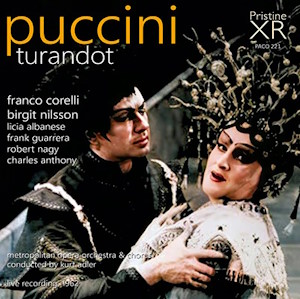
Giacomo Puccini (1858-1924)
Turandot
La principessa Turandot – Birgit Nilsson (soprano)
Calaf – Franco Corelli (tenor)
Liù – Licia Albanese (soprano)
Ping – Frank Guarrera (baritone)
Pang – Robert Nagy (tenor)
Pong – Charles Anthony (tenor)
Timur: Ezio Flagello (bass)
L’imperatore Altoum – Alessio De Paolis (tenor)
Un mandarino – Calvin Marsh (baritone)
Chorus and Orchestra of the Metropolitan Opera/Kurt Adler
rec. live radio broadcast, 24 February 1962, Metropolitan Opera House, New York City, USA
Reviewed as 24 bit FLAC download
Libretto, score etc. available with download purchase. Ambient Stereo
Pristine Audio PACO221 [119]
Although he covered very fully seven of the available recordings of Birgit Nilsson’s Turandot in his survey, Lee Denham did not include this Saturday matinée performance, now remastered into Ambient Stereo. The pairing of Nilsson and Corelli in their respective roles of Turandot and Calaf was of course a huge draw to the Met in the ‘60s and this adds a fourth option to hear that competitive partnership, the others being the studio recording under Molinari-Pradelli and two live Met performances under Stokowski and Mehta.
This comes complete with Milton Cross’ commentaries and applause for scenes and entrances, adding to the “live” atmosphere. The first voice we hear is Cavin Marsh’s virile baritone and the crowd screaming for blood – it is all very exciting, the chorus is evidently in top form and the sound is first class, especially now that Pristine has “doctored” it so successfully. Next we hear as Liù lirico-spinto soprano Licia Albanese, here in her early fifties and four years from the end of her Met career, then Corelli enters to acclamation, followed by Ezio Flagello’s rich, stalwart bass; – Adler’s conducting is taut and driven and it is obvious that we are in for a night of vocal thrills. The score can be bombastic – enjoyably so, especially when “interventionist” conductors like Stokowski have tampered with it, adding tam-tam strokes and harps (see Lee’s survey), but Adler is good at bringing out the detail of individual instrumental lines in quieter passages.
Albanese had a very successful career and is an artist I admire, but it is questionable whether her voice type was suited to portraying Liù as her voice always had a mature quality. She sounds more like Calaf’s nanny or Timur’s elderly nurse, then a naïve slave-girl. Her vibrato has begone to loosen and her timbre has a quavery glottal catch which make one long for the purity of Caballé or Moffo – yet evidently the audience loves it. Much more to my taste is Corelli’s reply to her in which he caresses every soaring phrase and the climax to the first act is stunning – thunderous timpani, howling chorus and an orchestra on fire – terrific, as the audience reaction confirms.
The Ping-Pang-Pong trio are not especially well matched or integrated; they tend to shout and bellow, using too much parlando and fracturing the line and I have heard smoother teams make more musical sense of their delicious trio opening to Act II, such as Mario Sereni, Piero De Palma and Tommaso Frascati in the Leinsdorf studio version – which also presents a very different kind of Calaf in Jussi Björling’s last commercial recording (review).
Corelli is absolutely thrilling, the sensuous beauty of his trumpet tones and sweet pianissimi validating his status as the pre-eminent Calaf of his – and perhaps any – generation. He is of course matched by Nilsson in sovereign, youthful voice, hurling out top notes like laser beams – the first top B is a scorcher – and demonstrating how well her voice is anchored by occasionally dipping into her lower register. Their first joint top C is an event, too – only someone needed to hoik out the persistent cougher in the subsequent verbal duel. Nilsson even manages to feign a semblance of “melting” at the close and the final few minutes are a celebratory vocal riot.
On balance, the big improvement in the sound effected by Pristine, the splendour of the two principal singers and the drive of Adler’s conducting pushes this very near the top of the “recommended” list – but I still think Albanese’s Liù is something of a liability and for me nothing beats Mehta’s studio recording with Sutherland and Pavarotti; however, I still want this one in my collection.
Ralph Moore
Availability: Pristine Classical


















